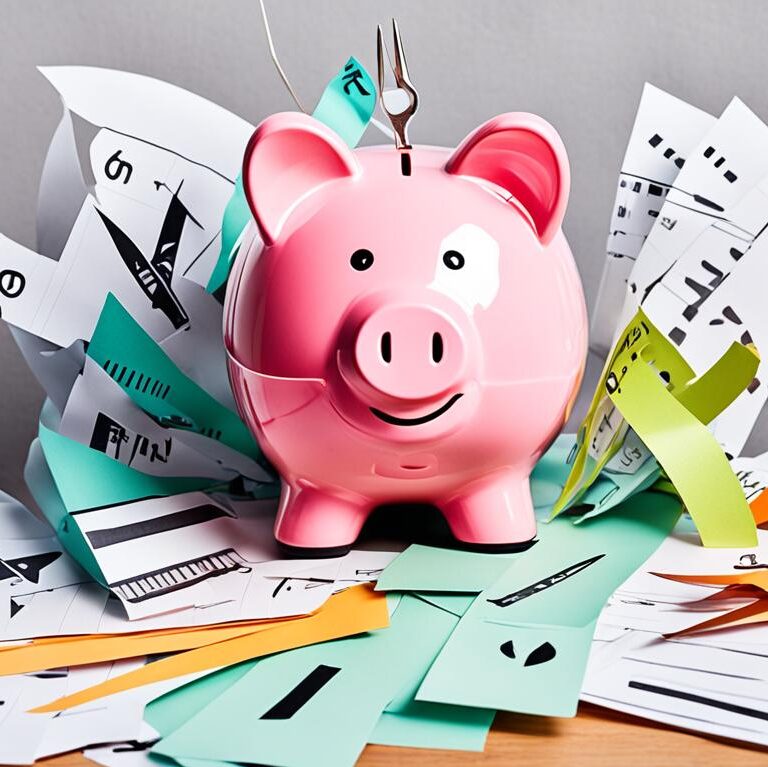“As an Amazon Associate I earn from qualifying purchases.”
Recessions aren’t just tough times; they’re also chances to grow. They force us to look at our money matters more closely. We can find smart ways to build our wealth even when the economy isn’t doing well. Remember when the U.S. had back-to-back quarters of shrinking economy in early 2022? It showed us how important it is to always be ready financially.
There are key steps to take to protect and grow your money. Building a big emergency fund, spreading your investments, and using accounts that save you on taxes are some of them. Putting money into industries that hold up well during downturns is another good move. For tips on how to manage your money right now, check out Recession Survival Hub.
Key Takeaways
- Creating an emergency fund with at least six months of expenses is crucial for financial safety during a recession.
- Diversifying investments, starting with index funds, can guard against market volatility.
- Investing in dividend-paying stocks can provide a consistent income stream.
- Focusing on recession-proof industries boosts portfolio resilience.
- Utilizing tax-advantaged accounts like 401(k)s and Roth IRAs can optimize tax savings and growth.
- Proactively managing and consolidating debt reduces financial stress.
Understanding the Impact of a Recession
A recession means the economy is significantly declining for more than a few months. The National Bureau of Economic Research (NBER) defines it this way. During this time, stock prices usually fall, markets become unpredictable, and many lose jobs or earn less. These changes affect all parts of financial planning, leading to the need for strong recession survival strategies.
The U.S. has seen several recessions, like the 2008 crisis and the recent downturn from COVID-19. Essential service sectors often do better in these times than luxury sectors. People always need things like healthcare and utilities, no matter the economy. Yet, layoffs are more frequent as companies try to save money, which makes the economy shrink more.
Interest rates often go up in a recession, making it harder for those with debts that change rates, like credit card users. A good tip for surviving a recession is to combine your debts into one loan with a fixed rate. This makes payments easier and can lower what you pay in interest. When it comes to investments, having a variety of them can lessen the impact. While it’s tempting to sell off investments when the market looks bad, remember that markets usually recover. This gives portfolios a chance to grow again.
It’s critical to keep investing, even when the market isn’t doing well. Opportunities during recessions can include selling stocks at a predicted lower price in the future or focusing on sectors that are less affected by economic downtrends. Working with a financial advisor to make or tweak a financial plan helps keep you on track. Above all, being proactive and reevaluating your financial approach regularly is crucial for getting through recessions well.
Reassess Your Budget and Cut Unnecessary Expenses
During tough times, it’s key to handle money wisely. Updating your budget each month helps remove expenses you don’t really need. This action keeps your finances in check.
When you budget wisely, you focus on saving. You also make sure essential costs are covered and your investments are safe. It’s important to know what you must spend on versus what you could skip. Using budget tools gives a clear view of your money.
Review Essential vs. Discretionary Spending
Essential spending covers must-haves like food, shelter, utilities, and medical care. In contrast, discretionary spending is for fun or luxury items, like eating out or new gadgets.
When times are hard, cutting back on these extra expenses helps. You can then use that money for more important things or for saving. It’s wise to keep up with debts. Keeping a good credit score matters, especially for house payments.
Use Budgeting Tools to Track Expenses
Using budget tools is a game-changer. For example, Morgan Stanley’s Spending and Budgeting Tool offers a deep dive into where your money goes. This helps in making smart money decisions.
By watching your spending, finding ways to save becomes easier. Also, setting a goal to save up several months’ worth of expenses is smart. This emergency fund is a cushion for tough times like job loss.
This approach keeps your money ready for both needs and growth chances, even in a recession.
Pad Your Emergency Savings
In these uncertain times, it’s crucial to beef up your emergency savings. This is your financial safety net during hard times. Experts suggest you should have three to six months of expenses saved. Catherine Valega, a certified financial planner, advises saving 12 to 24 months’ expenses for more security.
Importance of an Emergency Fund
An emergency fund is essential, not just nice to have. Experts say you need several months’ expenses saved for emergencies, like job loss or sudden medical bills. Since the average recession lasts about 15 months, having a solid reserve is key. A good emergency fund keeps you from selling investments when money gets tight.
Strategies for Building Your Fund
There are smart ways to grow your emergency fund during recessions. Here are some helpful tips:
- Earn extra by driving for Uber Eats or DoorDash. Use tax refunds and bonuses to add to your savings.
- Cut back on spending you don’t need. Put that money into your emergency fund instead.
- When you get a bonus or raise, save it instead of spending more. This will boost your emergency savings.
These tactics will strengthen your financial health during downturns. Adding even small amounts regularly can build up your emergency savings. Staying proactive helps you face tough times and maintain your financial well-being.
Diversify Your Investments
Building wealth during a recession requires a strong strategy. One key part is diversifying your investments. This means you mix different types of assets in your portfolio. It helps you lower the risks during economic lows. Diversified investments can protect your money from market swings. They keep your finances steady.

Benefits of Diversification
Diversification has many benefits, mainly lowering risk. U.S. recessions usually last about 13 months. During this time, some investments may lose value. But, if you diversify with bonds, stocks that pay dividends, and Treasury bills, you can still earn money. Even when the S&P 500 had a bad week in 2024, sectors like consumer staples and utilities did well. They’re always in demand.
Types of Diversified Investment Options
There are many ways to diversify your investment. Here are some ideas:
- Commodities: Commodities might not do well in recessions. But, they can be good as economies start to recover.
- Alternative Investments: Adding unique items like art, classic cars, or music royalties can make your portfolio interesting.
- Real Estate: Real Estate Investment Trusts (REITs) offer both stability and a chance for growth.
- Sectors with Resilience: Investing in healthcare, consumer staples, and discount retailers is smart. They tend to stay strong when the economy is weak.
Also, think about tax-advantaged options like Roth IRAs and 401(k)s to further diversify. For tips on staying financially stable during downturns, check out this recession survival hub.
Focus on Recession-Proof Investments
In tough economic times, choosing the right investments is key. Focusing on sectors like consumer staples, healthcare, and utilities is smart. These sectors provide must-have goods and services, so they often stay strong. For example, companies like Walmart remain solid because they keep selling what people need, regardless of the economy.
It’s wise to look back at how investments have done in past recessions. Take gold, for instance. While the stock market dropped by 17.37% and 29.72% during the 1973 and 1974 recessions, gold’s price shot up by 73.49% and 67.04%. Gold stands out as a safe bet when markets fall, unlike tech and energy sectors, which may not do as well.
Another strategy is choosing large companies over smaller ones. Big businesses often have the means to get through tough times better. They attract investors seeking reliability with minimal debt and strong cash flows. These types of investments generally do well in a downturn. You can get more strategies for recession-proof investments at Morningstar.
Diversifying your portfolio is crucial. Investing in sectors with constant demand, like utilities, consumer staples, and healthcare, is a wise move. Looking at U.S. Treasury bonds is also a good idea. They’re considered ultra-safe due to government backing. This makes them a top choice when the economy is shaky.
Looking at historical data, it’s best to steer clear of assets with big price swings, like cryptocurrencies. Over the last two years, crypto prices have been all over the place, with dramatic ups and downs. This volatility makes them risky during economic lows. For tips on doing well in hard times, check out this guide.
A mixed portfolio, including investments that hold up in a downturn, can help keep your wealth growing even when the economy isn’t.
| Asset | Performance During Recession |
|---|---|
| Gold | Increased by 73.49% in 1973; 67.04% in 1974 |
| U.S. Treasury Bonds | Principal protection with government backing |
| Consumer Staples & Healthcare | Stable demand, less volatile |
| Large-Cap Companies | Resilient with resources to endure market challenges |
| Cryptocurrencies | Highly volatile, risky investments during downturns |
Leveraging Tax-Advantaged Accounts
When the economy is down, smart financial planning becomes crucial but can also be very rewarding. Using tax-advantaged strategies can help secure your finances and increase your wealth. An effective way is through tax-advantaged accounts.
Benefits of Retirement Accounts
Retirement accounts like 401(k)s and Roth IRAs bring big tax perks into your financial plan during tough times. They let you grow your savings with either tax-deferred or tax-free benefits. This makes your investments grow faster over time.
“Investing in a 401(k) can reduce your taxable income, which is particularly beneficial during a recession when every dollar counts.”
Roth IRAs provide tax-free growth, which means more financial freedom when you retire. By putting as much as you can into these accounts, you greatly boost your future savings. Plus, you get to enjoy tax benefits now.

| Account Type | Benefit |
|---|---|
| 401(k) | Reduces taxable income |
| Roth IRA | Tax-free growth |
Exploring Real Estate Tax Deductions
Investing in real estate also comes with tax benefits. You can lower your taxes by deducting things like mortgage interest and property taxes. Depreciation deductions also offer savings.
1031 Exchanges are a way to put off paying taxes on profits from selling properties. By reinvesting those profits, you can grow your real estate investments without paying immediate taxes on gains. This helps your portfolio expand.
Adding these tax-friendly investments to your plan can build your wealth during downturns. This ensures you’ll come out ahead when the economy improves.
Tackle Debt Proactively
Dealing with debt directly is key to managing it well during tough times. With interest rates set by the Federal Reserve between 4.75-5 percent in March 2023, paying off debt gets harder. Taking proactive steps reduces stress and helps with stability in the long run.
Advantages of Debt Consolidation
Combining debts into one loan is a smart move. This way, borrowers often get a lower rate. It makes handling payments easier, especially with rising interest rates. As recession chances hit 64 percent, managing debt effectively becomes even more important.
Prioritize High-Interest Debt
In recession times, it’s key to focus on high-interest debt first. Nearly 36 percent of Americans have more credit card debt than savings. By targeting these debts, you reduce the impact of growing interest. This approach, known as the “Avalanche” method, improves your financial health and keeps debt in check.
How to Build Wealth During a Recession
Navigating a recession takes strategic planning and resilience. Economic downturns bring challenges and unique investment chances. Knowing how to make the most of these chances is crucial for wealth growth during these times.
Investment Opportunities During a Downturn
Recessions happen when there’s a big drop in economic activity. They can be caused by financial crises or rising inflation. In these times, some investments can be very profitable. For example, investing in essentials like food, health care, and personal hygiene products is smart. These sectors do well no matter the economy’s state. Bonds are also good during recessions. They are more stable than stocks, offering a secure investment choice.
Investing in mutual funds that focus on essentials or large companies is wise. They offer professional management and spread out the risks. Dividend stocks are another good choice. They pay you money regularly, providing income during tough times.
Maintaining a Long-Term Investment Strategy
To build wealth in a downturn, stick to a long-term investment plan. Look for assets that are solid, with low debt, high returns, and stability. Experts suggest methods like dollar-cost averaging. This means putting in money regularly, which reduces the risks of market ups and downs. Diversifying your investment is key. Adding different kinds of assets, like insurance-linked securities, can protect your money.
With more people seeking financial advice during recessions—60% more—it’s good to talk to an adviser. They can guide you based on your long-term financial goals. Focusing on passive income sources like dividends, interest, and rent ensures steady money with little effort.
Using these strategies helps you not just survive downturns but come out ahead. By targeting the right investment opportunities and sticking to a solid, long-term plan, growing your wealth in a downturn is possible.
FAQ
What are some effective wealth-building strategies during a recession?
How can I understand the impact of a recession on my finances?
How should I reassess my budget during a recession?
Why is having an emergency fund important during a recession?
What are the best ways to build an emergency savings fund?
How can diversification benefit my investment portfolio during a recession?
What types of investments should I consider for diversification?
What are recession-proof investments?
How do tax-advantaged accounts help in financial planning during a recession?
What are the benefits of debt consolidation during a recession?
Why should I prioritize high-interest debt during a recession?
What investment opportunities exist during an economic downturn?
How important is it to maintain a long-term investment strategy during a recession?
“As an Amazon Associate I earn from qualifying purchases.”

